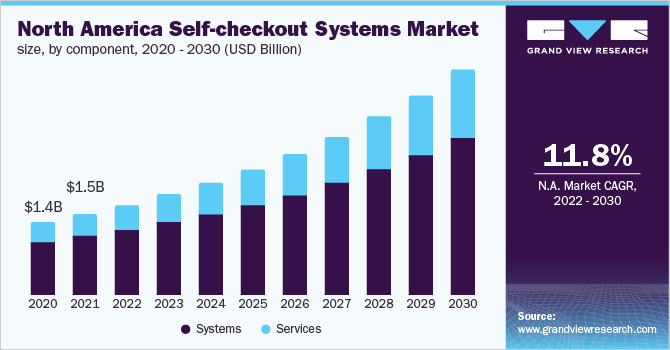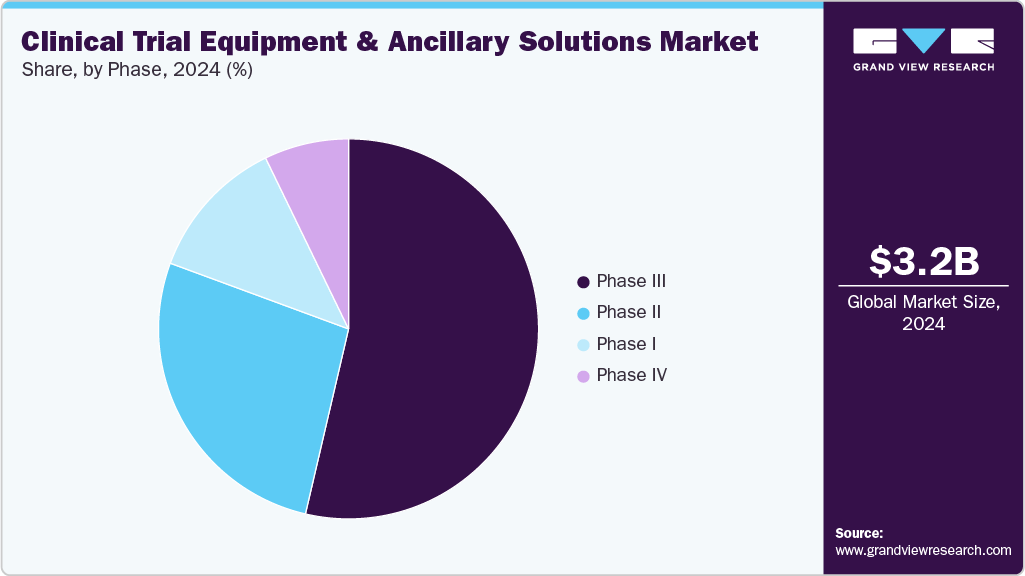Self-checkout Systems Industry Overview
The global self-checkout systems market size was valued at USD 3.44 billion in 2021 and is expected to expand at a compound annual growth rate (CAGR) of 13.3% from 2022 to 2030. During the COVID-19 pandemic, the need to maintain social distancing, reduce wait time in queues, and offer products beyond retail store premises triggered the overall market growth. The market is primarily driven by the increasing retail space cost and growing consumer queue time to order or checkout. Furthermore, the shortage of skilled laborers in developing nations, rising labor costs, and inclination toward personalized shopping experience are some of the other factors boosting the market growth.

Self-checkout systems are automated systems deployed across retail, grocery stores, and hospitality industries to help the customer in checkout and self-order without the help of any employees. The earlier self-checkout systems included separate, off-the-shelve components and occupied a large storage area. On the contrary, the current self-checkout systems are re-engineered and manufactured as per demand to suit the store structure and improve functionalities, costs, form factors, and reliability. The growing trend of secure and self-payment technologies has resulted in kiosk vendors providing cashless systems and is expected to fuel the market growth over the next couple of years.
Gather more insights about the market drivers, restraints, and growth of the Global Self-checkout Systems Market
Automation is rapidly becoming the key transformational force across many industries worldwide. The increased penetration of automation across industries/sectors such as retail and hospitality is likely to drive the adoption of self-checkout systems across store operations and warehouses. Features such as self-scan and pay and self-ordering, while avoiding large queues, contribute to their increased popularity in the market. In addition, to cope with the declining workforce, the adoption of robotic and automation products has risen notably in the retail sector in recent years.
Technology developments and increasing IoT penetration in the retail space continue to contribute to the growth of the market at a steady pace. Shop owners are increasingly investing in technology to reduce in-store issues related to inventory mapping, product information identification, payment, and customer experience. For instance, motion sensors and lasers help retailers detect if a product is shoplifted or a product has not been scanned at a self-checkout counter. Moreover, the deployment of self-checkout systems would help customers understand several product features and promotional offers provided in the store and check out quickly without any intervention from employees. Therefore, self-checkout systems also serve as an additional touchpoint allowing store owners to improve customer engagement and enhance their shopping experiences.
Even though the market is anticipated to witness steady growth owing to the aforementioned benefits, lack of awareness and rising instances/incidences of skimming, fraud, and shoplifting are expected to pose a challenge to the market growth. Reluctance to use self-checkout services among the elderly population is another factor that may impact the industry growth. Senior citizens with mobility issues and conditions such as dementia, and hearing, sight, and memory loss require more outstanding care. Additionally, limited technology know-how in underdeveloped economies often leads to the avoidance of self-checkout systems across retail outlets.
The COVID-19 pandemic had a significant impact on the global market. The spread of COVID-19 urged governments across the globe to undertake several precautionary methods. Many retailers implemented business models at a higher rate, from zero-touch practices to remote working. These practices created avenues as well as challenges for the market growth. Furthermore, the limited availability of the workforce in retail shops promoted a self-servicing shopping experience, wherein consumers selected the required products without the intervention of an employee to guide them on the product details. However, procuring raw materials and components across countries was a challenge among the vendors owing to the shutdown of operations. As most of the suppliers were concentrated in China and other Asia Pacific countries, the supply of components was halted due to the halting of travel and transportation during the lockdown phase.
Browse through Grand View Research's Next Generation Technologies Industry Related Reports
Digital Payment Market - The global digital payment market size was valued at USD 68.61 billion in 2021 and is expected to expand at a compound annual growth rate (CAGR) of 20.5% from 2022 to 2030.
Payment Gateway Market - The global payment gateway market size was valued at USD 26.79 billion in 2022 and is expected to expand at a compound annual growth rate (CAGR) of 22.2% from 2023 to 2030.
Self-checkout Systems Market Segmentation
Grand View Research has segmented the global self-checkout systems market on the basis of component, type, application, and region:
Self-checkout Systems Component Outlook (Revenue, USD Million, 2018 - 2030)
- Systems
- Services
Self-checkout Systems Type Outlook (Revenue, USD Million, 2018 - 2030)
- Cash Based Systems
- Cashless Based Systems
Self-checkout Systems Application Outlook (Revenue, USD Million, 2018 - 2030)
- Supermarkets & Hypermarkets
- Department Stores
- Convenience Stores
- Others
Self-checkout Systems Regional Outlook (Revenue, USD Million, 2018 - 2030)
- North America
- Europe
- Asia Pacific
- Latin America
- MEA
Market Share Insights:
June 2021: Toshiba Corporation entered into a partnership with Worldline, a France-based payment solution provider, which brings Toshiba’s Pro-X Hybrid Kiosk to market in this partnership. The kiosks are aimed at helping retailers offer a better flexible outlook to the point of sale (POS) in their stores, making the check-out experience more sophisticated for the customers.
February 2021: Pyramid Computer GmbH entered into a partnership agreement with Scheidt & Bachmann GmbH. This Germany-based enterprise offers solutions for retail stores across fuel and parking sites. As per the agreement, the latter company would integrate its SIQMA Smoove, a checkout solution, into the former company’s hardware. The two companies intend to promote self-checkout solutions at fuel retail stores.
Key Companies profiled:
Some prominent players in the global Self-checkout Systems market include
- Diebold Nixdorf, Inc.
- ECR Software Corporation
- FUJITSU
- Gilbarco Inc.
- ITAB Group
- NCR Corporation
- Pan-Oston
- PCMS Group Ltd.
- StrongPoint
- Toshiba Global Commerce Solutions
Order a free sample PDF of the Self-checkout Systems Market Intelligence Study, published by Grand View Research.


No comments:
Post a Comment